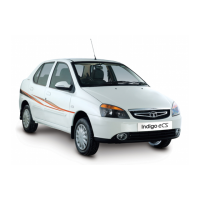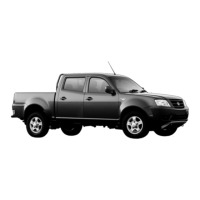
Do you have a question about the TATA Motors Tata Indigo Diesel and is the answer not in the manual?
| Brand | TATA Motors |
|---|---|
| Model | Tata Indigo Diesel |
| Category | Automobile |
| Language | English |
Provides contact details for customer support and dealerships.
Explains warnings, cautions, notes, and symbols used in the manual.
Identifies and labels components of the Indigo's front exterior.
Identifies and labels components of the Indigo's rear exterior.
Identifies and labels interior components of the vehicle.
Details and labels all components visible on the dash panel.
Explains the gauges, indicators, and displays of the instrument cluster.
Identifies and labels components within the DICOR diesel engine compartment.
Identifies and labels components for BS-II/BS-III diesel engines.
Shows locations of chassis and component identification numbers.
Details adjustments for front seats: sliding, reclining, height, and head restraints.
Explains how to lower and fold the rear seatback for access or space.
Provides guidance on proper seat belt use, routing, and reminders for all occupants.
Explains the function and operation of rear door child safety locks.
Covers the use of keys for various locks, including door, trunk, and ignition.
Explains the ignition switch positions and the steering lock mechanism.
Identifies the accelerator, brake, and clutch pedals.
Details the operation and pattern of the manual gear shift lever.
Explains the operation of the parking brake and the vehicle horn.
Describes the gauges, indicators, and LCD display for vehicle operation.
Details controls for headlamps, tail lamps, and parking lamps.
Explains the operation of left and right turn signal indicators.
Explains how to adjust headlamp beam angle for load compensation.
Details the operation of front and rear fog lamps.
Explains the different modes of windshield wiper operation.
Describes how to operate the windshield washer system.
Details the HVAC system controls for temperature, fan speed, and air direction.
Explains the operation and direction control of cabin ventilators.
Describes the operation of the rear window defroster.
Covers adjustment of inner and outer rear view mirrors.
Explains operation of manual and power windows.
Details sunvisors, eyeglasses case, and vanity mirror.
Covers front roof, rear roof, trunk, and engine compartment lamps.
Explains the 12V accessory socket and clock adjustment.
Details the location and use of ashtrays and the glove box, including the first aid kit.
Describes storage pockets in doors and the rear trunk area.
Covers provisions for audio installation and optional multimedia systems.
Covers important warnings regarding vehicle load, children, catalytic converters, and CO gas.
Emphasizes safe driving practices including seat belts, lights, and avoiding impairment.
Details checks for tires, fluids, lights, wipers, and brakes before driving.
Outlines pre-drive checks and the procedure for starting the engine.
Covers engine idling after starting, stopping the engine, and parking guidelines.
Explains the break-in procedure for new vehicles and driving a diesel engine.
Details the process and recommendations for upshifting and downshifting gears.
Provides advice on maximizing fuel efficiency through driving style and maintenance.
Offers tips on operating the vehicle to minimize environmental impact.
Covers safe driving practices for rain, deep water, and night conditions.
Introduces the importance of regular maintenance for vehicle longevity and performance.
Details the schedule and availability of complimentary service visits.
Lists common fluid capacities and specifications for refuelling and maintenance.
Specifies recommended engine oil, transaxle oil, brake fluid, power steering fluid, and coolant.
Provides step-by-step instructions for opening and closing the vehicle's bonnet.
Explains the operation and replacement of the engine compartment lamp.
Details the location and proper usage of the fuel cap.
Covers checking engine oil level and performing oil and filter changes.
Explains air filter cleaning and replacement procedures.
Details checking coolant level and adding coolant to the system.
Lists common causes of engine overheating and necessary actions.
Provides a procedure for changing the engine coolant.
Details the procedure for replacing the DICOR diesel engine fuel filter.
Explains the procedure for draining water and sediment from the fuel sedimenter.
Covers draining and changing the BS-II/BS-III diesel engine fuel filter.
Details brake fluid level checks and recommended replacement intervals.
Covers checking power steering fluid level and replacement intervals.
Provides the procedure for bleeding air from the power steering system.
Explains how to adjust the parking brake cable.
Covers battery checks for corrosion, electrolyte level, and charging.
Details the procedure for adjusting the clutch cable.
Provides maintenance tips for the turbocharger and intercooler.
Explains the function and recommended fuel for the catalytic converter.
Covers tyre replacement, pressure, wear, rotation, balancing, and alignment.
Details maintenance and replacement of windshield wiper blades.
Explains the location and type of fluid for the washer reservoir.
Covers inspection and replacement of accessory belts for DICOR and BS-II/BS-III engines.
Details checking transaxle oil level and replacement procedures.
Explains how to check and replace fuses and relays.
Details the procedure for replacing headlamp bulbs.
Covers replacement of front turn indicators and position/parking lamps.
Details bulb replacement in the tail lamp assemblies.
Notes that the high-mount brake lamp is non-serviceable and requires professional replacement.
Explains how to replace registration plate lamp bulbs.
Details replacing side turn indicator lamp bulbs.
Explains replacing front and rear roof lamp bulbs.
Details replacing the trunk lamp bulb.
Explains replacing the engine compartment lamp bulb.
Provides tips for cleaning and maintaining the vehicle's interior and exterior surfaces.
Offers advice on storing the vehicle for extended periods.
Lists the contents of the vehicle's tool kit for emergency repairs.
Explains the location and proper deployment of the advance warning triangle.
Provides a detailed procedure for safely jump-starting a vehicle using jumper leads.
Details the step-by-step process for changing a flat tire.
Explains the proper use of tow hooks and towing procedures.
Offers guidance for diagnosing and resolving common vehicle problems.
Outlines the terms, conditions, and limitations of the vehicle's warranty.
Lists contact information for Tata Motors corporate offices.
Lists authorized service centers, dealerships, and providers across various regions.
Provides detailed technical specifications for the vehicle's engine, chassis, and performance.
Lists the vehicle's curb weight, GVW, and payload capacity for different models.
Provides a log to record details of warranty-related repairs performed on the vehicle.
Offers a log to record regular scheduled maintenance services performed.
Defines common abbreviations and acronyms used throughout the manual.
An alphabetical listing of topics and their corresponding page numbers for easy reference.
Explains the benefits and terms of the available extended warranty service.
Recommends fuel additives for cleaning the fuel system and improving engine performance.
Details treatments for rust prevention, engine compartment protection, and vibration reduction.
Describes programs for exterior detailing and interior protection against stains and fading.











